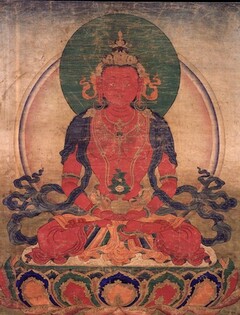Amitāyus Longevity Practice
Practices › Longevity | Deities › Amitāyus | Tibetan Masters › Mipham Rinpoche | Tibetan Masters › Jamyang Khyentse Chökyi Lodrö

Amitāyus, Boundless Life
Courtesy of Himalayan Art Resources
Further information:
- Treasury of Lives Author Bio
- BDRC Author Profiles: P252 P733
༄༅། །རང་གཞན་གྱི་གློ་བུར་ཚེ་སྒྲུབ།
Extemporary Practice of Longevity for Oneself or Others
by Mipham Rinpoche
རང་གཞན་གྱི་གློ་བུར་ཚེ་སྒྲུབ་ལ། །
As an extemporary practice of longevity for yourself or others, visualise for yourself or the object of focus:
རང་ངམ་དམིགས་བྱའི་སྤྱི་བོར་བཅོམ་ལྡན་འདས་ཚེ་དཔག་ཏུ་མེད་པ་དཀར་པོ་ལོངས་སྐུའི་ཆས་ཅན་ཕྱག་མཉམ་བཞག་གིས་ཚེ་བུམ་བསྣམས་པ་ལ་
chiwor chomdendé tsé pak tu mepa karpo longkü chechen chak nyamzhak gi tsebum nampa la
At the crown is the Bhagavan Amitayūs, white, with the saṃbhogakāya accoutrements, and with his hands in the gesture of equanimity, holding a long-life vase.
མོས་གུས་ཀྱི་མཚན་ནས་བརྗོད་ཅིང་གསོལ་བ་བཏབ་ལ། ཚེ་གཟུངས་འབུམ་བཟླས་པས།
Devotedly recite his name and pray to him. Recite the long-life dhāraṇī1 one hundred thousand times, as a result of which:
ཐུགས་ཀའི་འོད་ཀྱིས་འཁོར་འདས་ཀྱི་ཚེ་བཅུད་བདུད་རྩི་འོད་ཟེར་དཀར་པོའི་རྣམ་པར་བསྡུས།
tukké ö kyi khordé kyi tsechü dütsi özer karpö nampar dü
Light from his heart collects the vital essence of saṃsāra and nirvāṇa, which appears concentrated in the form of white elixir that emits rays of light.
ཕྱག་གི་ཚེ་བུམ་དུ་བབ་པ་གང་ཏེ་ལུད་པ་དམིགས་བྱའི་སྤྱི་གཙུག་ནས་ཞུགས་པས་ལུས་གང་རྩ་རླུང་ཐིག་ལེའི་ཚེ་ཉམས་པ་གསོས། །
chak gi tsebum du babpa gang té lüpa mik jé chitsuk né zhukpé lü gang tsa lung tiklé tsé nyampa sö
This elixir fills the long-life vase in his hands, then overflows and enters the crown of the object of focus, filling their entire body and restoring any loss of vitality in the channels, wind-energies or essences.
ཚེ་འཕེལ་ཞིང་བཀྲག་མདངས་ལྡན་པར་བསམ།
tsé pel zhing trakdang denpar gyur
Longevity is thereby extended and the lustre of health restored.
ཡང་ཨ་མཱ་ར་ཎི་ལན་བདུན་བརྗོད་པས།
Then, by reciting the amaraṇi mantra seven times:
བདུད་རྩིའི་རྒྱུན་གྱིས་སྙིགས་མའི་ལུས་སྦྱང་རྡོ་རྗེའི་སྐུར་གྱུར་པར་བསམ།
dütsi gyün gyi nyikmé lü jang dorjé kur gyurpar gyur
The flow of elixir purifies the tainted body and transforms it into a vajra form.
ཕྱིན་དྲུག་སྟོབས་ཀྱིས་སོགས་ཚིགས་བཅད་བརྗོད་པས།
Recite the verse that begins, "Through the strength of the six perfections…" As a result:
ཚེ་དཔག་མེད་བདུད་རྩིའི་རྣམ་པར་ཞུ། །
tsepakmé dütsi nampar zhu
Amitāyus melts into the elixir,
དམིགས་བྱའི་སྤྱི་གཙུག་ནས་ཐིམ་པས་འཆི་མེད་རྡོ་རྗེའི་ཚེ་ཐོབ་པར་བསམས་ལ་གཟུངས་ཚར་གཅིག་བརྗོད།
mik jé chitsuk né timpé chimé dorjé tsé tobpar gyur
And dissolves into the object of focus at the crown, so that they attain immortal vajra longevity.
With this in mind, recite the dhāraṇī once.
སྦྱིན་བདག་འཁོར་བཅས་སོགས་བཀྲ་ཤིས་ཚིགས་བཅད་བརྗོད་དོ། །
Recite the verses of auspiciousness beginning, "May the wishes and aims of the patrons and their associates…
དེས་ཚེ་ཡི་གེགས་ཞི་ཞིང་ཚེ་ཤིན་ཏུ་རིང་པོར་འཚོ་བར་འགྱུར་རོ། །
dé tsé yi gek zhi zhing tsé shintu ringpor tsowar gyur ro
This will pacify hindrances and bring about an exceedingly long life.
རྒྱུད་སྡེའི་དགོངས་པ་བཞིན་ཆུ་འབྲུག་ཟླ་བ་ལྔ་པའི་ཚེས་གཅིག་ལ་འཇམ་དཔལ་རྡོ་རྗེས་སོ། །
Jampal Dorje wrote this according to the intent of the tantras on the first day of the fifth month of the Water Dragon year.2
| Translated by Adam Pearcey with the generous support of the Khyentse Foundation and Tertön Sogyal Trust, 2022.
Sources:
mi pham rgya mtsho. "rang gzhan gyi glo bur tshe sgrub/." In gsung 'bum/_mi pham rgya mtsho. Chengdu: [gangs can rig gzhung dpe rnying myur skyobs lhan tshogs], 2007. (BDRC W2DB16631). Vol. 29: 73–74.
'Jam dbyangs chos kyi blo gros. "rang gzhan gyi blo [sic] bur tshe sgrub/" in 'Jam dbyangs chos kyi blo gros kyi gsung 'bum. 12 vols. Bir: Khyentse Labrang, 2012. W1KG12986. Vol. 7: 581–582
Version: 1.0-20220113
- ↑ i.e., the dhāraṇī of Amitāyus. See https://www.lotsawahouse.org/words-of-the-buddha/amitayus-dharani
- ↑ 25 June 1892